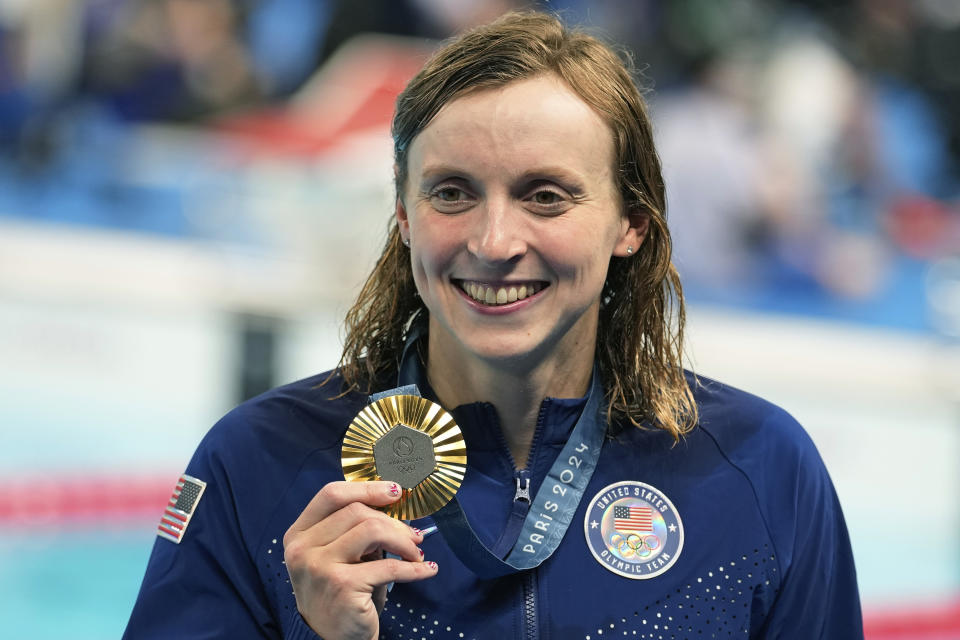PARIS — It was at 9:40 p.m. that Olympic record books opened and Katie Ledecky, nine times golden, splashed in once again. Thousands stood and saluted the perpetual queen of distance swimming. “Katie! Katie! Katie,” they chorused. Ariarne Titmus, defeated by greatness in the 800-meter freestyle, embraced her idol, and later applauded. Ledecky, relieved and joyous, threw her head back into the water, then prepared to emerge and accept the adulation.
But first, she hung in the pool, lifted her right hand, and flashed four fingers.
Ledecky is famously humble. She pleads indifference toward statistics. But on Saturday night, with victory in a “tough” 800 free, she joined an exclusive club that contextualizes her greatness, and that even she couldn’t ignore.
Ledecky equaled Michael Phelps, Carl Lewis, Al Oerter and a few others as the only Olympians to win the same event four consecutive times.
So she wiggled those four fingers.
An hour later, she reverted to humility. She seemed unmoved by another remarkable stat. She had tied Soviet gymnast Larisa Latynina for most golds won by a female Olympian, with nine. “I really just don’t think about these things very much,” she said.
But the four-peat, she acknowledged, “is the one that means the most to me.”
Why? “Given that Michael’s the only [swimmer] that’s ever done that, I think that just shows how difficult it is.”


She completed it, out-touching Titmus by 1.25 seconds, 12 years to the day since her first Olympic final, at London 2012. The date, Aug. 3, is engraved in her mind. The memory, of “flipping at the 600 mark, knowing that I was 200 meters away from my first gold,” she recalled, is still vivid.
She was 15 at the time, still a girl, wholly incapable of conceptualizing four straight Olympic titles. But she “could visualize” that first one, she explained here this week. And once she won it, she never looked back.
She won the 800 without fail for more than a decade, at three straight Olympics and an unprecedented six straight world championships. Challengers like Titmus emerged — from Grade 6 in 2012 to Lane 3 in 2024, nearly neck-and-neck for 500 meters — but Ledecky stayed ahead.
“That’s how remarkable she is,” Titmus said.
The life cycles of sport typically dictate a changing of the guard, a passing of the proverbial torch, to up-and-comers like Titmus or Canada’s Summer McIntosh. In February of this year, McIntosh snapped Ledecky’s streak at a domestic meet in Orlando. Had McIntosh entered the 800 in Paris — she opted to instead swim (and win) the 200 individual medley on Saturday night — perhaps the four-peat would’ve been imperiled.
But Ledecky held them off. She now owns the 17 fastest female times in the history of the 800. She has raced the race dozens and dozens of times, and trained it hundreds more — “it’s just a lot of miles,” she pointed out — and she has never tired. She has slowed, slightly, but never slipped.
That’s why she was so proud of the four-peat. “Year after year,” she explained, she’d been “trying to put in the work to make it happen.”
And even after she’d put in the work, “being able to come back Olympics after Olympics and be able to get the job done” is “really hard.”
She admitted to feeling pressure in Paris. She knew the significance of Aug. 3; she wanted to keep it a golden date rather than “a day that I didn’t like moving forward.” She also knew that Titmus “was gonna give me everything she had,” and the Aussie star certainly did. From the 100-meter mark to the 500, Titmus hung between 0.20 and 0.34 seconds behind the woman who has inspired her.
But then Ledecky, slowly but surely, stroke by stroke, pulled ahead.
She pulled herself to the wall, and touched in 8:11.04, and broke into an unrestrained smile.
The history had weighed on her, but it hadn’t weighed her down, and as she paraded around the pool deck, triumphant and peerless, a fan’s sign summed up her latest Olympic feat.
“Legendecky.”

